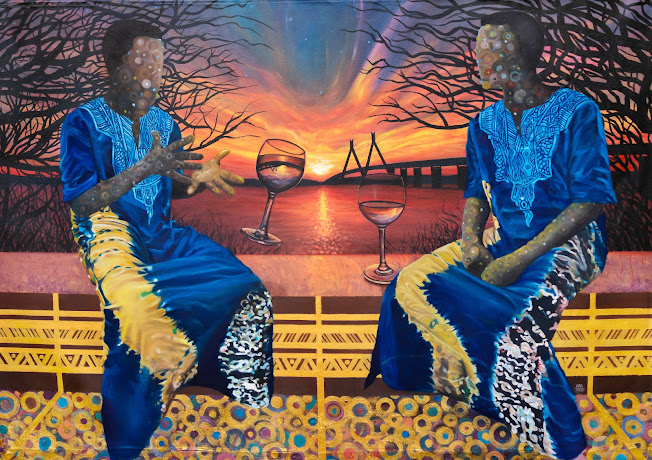 |
Banu So, oil and acrylic on canvas, 84 inches by 60 inches, 2020-2021 |
Post-COVID realities;
Commentary on capitalism and consumerism, and their associated culture;
Gender and familial relationships and values;
Didactics on specific social issues.
I am interested in these topics for several reasons: each of them has expansive subject matter, and these five categories embody critical issues of engagement for Africans at home and abroad. Contemporary African artists have always been at the forefront of communicating their ideas and reflecting those of their societies in a rich and continued ritual of documentary. It is only fair enough that contemporary curators meet these artists halfway to push forward vital narratives for the education and re-education of Africans and everyone else.
Sociopolitical and geopolitical commentary
Arguably, the biggest factor that affects the quality of lived experiences of Africans at home and abroad is politics. Many people have ideas of how the polity in their communities influences them, but little is known about what their roles in leadership are. There is a great need for education on what leadership really means and how the average person can participate, both on a personal level and in a communal sense. There is a marked departure from how we led our lives historically as a people. As a curator, I believe there is a need for a resurgence of creative narratives that touch on the values that define us.
There is also the question of geopolitics. We live in a globalized world, and the effects of policies and tensions are felt across cultures. It is interesting to cast a gaze upon how Africans are affected and what roles we play in the global geopolitical conversation. Creatives speak extensively through their works of art about subjects such as migration, racism, and class from an African perspective. It is important for those of us in the creative industry to continue to highlight these thoughts and to chart a course toward coherence in cultural thought.
Post-COVID realities
The world has been very fast-paced, especially in the 21st century. This pace was dulled temporarily by the COVID-19 pandemic and its attendant lockdowns, but things have since picked up speed. The alarming thing to note, however, is that humanity seems to have missed out on the lessons that ought to have been learned. As General James Mattis, former U.S. Secretary of Defense, puts it, “In rather breathtaking speed, the pandemic has upended things, pushing our planning horizons, it seems, almost to nothing. We’re flying blind into some very, very uncertain future that’s out there.”
The African needs to know where they fit within the scope of things and how to manage this new normal filled with uncertainties. This is notwithstanding the fact that Africa has generally been mired in uncertainty—economically, culturally, and otherwise. We have been trying to make strides in the right direction to solve our problems, but with the new normal looming before our consciousness, we have to be more critical in the ways we look at and engage with our world. Artists, of course, have interesting takes on how we are dealing with these challenges, as well as their own ingenious ideas for moving forward. It would be interesting to have those perspectives documented.
Capitalism and consumerism
There are two main narratives stemming from capitalism in Africa: a historical narrative embedded in imperialistic tendencies, and a contemporary narrative that requires us to be very objective in our analysis of and engagement with this model of business. Sub-themes such as African consumer culture, the resource curse, and Africa’s evolving role in the ever-expanding global economy are worthy of notable consideration.
I think money—how it is made and how it is spent in Africa—is a very important topical issue. Our psychology in relation to money is also very important to discuss. A good case in point is the current fiscal crisis in Nigeria and how it is tied to every facet of our lives. It is important, for the sake of enlightenment, to document how artists are engaging in this critical conversation.
 |
| Constellations in my compound, oil and acrylic on canvas, 48 inches by 60 inches, 2022 |
Gender and familial relationships
The basic building block of any society is the family unit. It is no news that this unit has been under threat across the world, and Africans need to develop stronger family structures. Creatives have numerous stories to share based on identity borne out of family relationships. These stories are not only suitable for literary stimulation but also for cultural instruction, showing us how we can take a leaf from these stories to build stronger family structures. The feelings of love, pain, loss, joy, grief, and so on are at the core of the human experience. I believe that highlighting them will help not only to instruct us but also to validate these experiences within us. I also consider documentation of the thoughts and ideals of women and advocates for women’s rights to be of utmost importance. I think we have not properly explored these ideas from enough perspectives. Social issues such as gender dynamics in the home and workplace, gender-based violence, and related topics need more light shed upon them.
Specific social issues
From time to time, specific social issues come to the fore and require intense creative engagement as a response. Nina Simone opines that “it is the responsibility of artists to reflect the times,” and I think this is very important. A good example of this is the response of artists to the #MeToo and #BlackLivesMatter movements in the not-too-distant past, and the potential reactions of Nigerian artists to current unrest caused by fuel scarcity, currency scarcity, and other pressing challenges in the country.